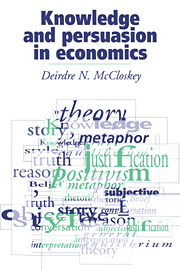Book contents
- Frontmatter
- Contents
- List of figures and tables
- Preface
- Acknowledgments
- Part I Exordium
- Part II Narration
- Part III Division
- Part IV Proof
- Part V Refutation
- 14 The very idea of epistemology
- 15 The tu quoque argument and the claims of rationalism
- 16 Armchair philosophy of economics
- 17 Philosophy of science without epistemology: the Popperians
- 18 Reactionary modernism: the Rosenberg
- 19 Methodologists of economics, big M and small
- 20 Getting “rhetoric”: Mark Blaug and the Eleatic Stranger
- 21 Anti-post-pre-metamodernism: the Coats/McPherson/Friedman
- 22 Splenetic rationalism, Austrian style
- 23 The economists of ideology: Heilbroner, Rossetti, and Mirowski
- 24 Rhetoric as morally radical
- Part VI Peroration
- List of works cited
- Index
23 - The economists of ideology: Heilbroner, Rossetti, and Mirowski
Published online by Cambridge University Press: 01 February 2010
- Frontmatter
- Contents
- List of figures and tables
- Preface
- Acknowledgments
- Part I Exordium
- Part II Narration
- Part III Division
- Part IV Proof
- Part V Refutation
- 14 The very idea of epistemology
- 15 The tu quoque argument and the claims of rationalism
- 16 Armchair philosophy of economics
- 17 Philosophy of science without epistemology: the Popperians
- 18 Reactionary modernism: the Rosenberg
- 19 Methodologists of economics, big M and small
- 20 Getting “rhetoric”: Mark Blaug and the Eleatic Stranger
- 21 Anti-post-pre-metamodernism: the Coats/McPherson/Friedman
- 22 Splenetic rationalism, Austrian style
- 23 The economists of ideology: Heilbroner, Rossetti, and Mirowski
- 24 Rhetoric as morally radical
- Part VI Peroration
- List of works cited
- Index
Summary
Economics, praise the Lord, is starting to look at itself with a richer theory of discourse than the received view in the philosophy of science. Economists believe they follow the received view, but of course they do not. No one does. As the psychologist David Bakan remarked early on, “The common rhetorical form ‘science is this’ and ‘science is that’ is hardly ever backed up with empirical observations on the scientific enterprise itself” (Bakan 1967, p. 140). Two books by Philip Mirowski (1989, 1991c), and a paper by Jane Rossetti (1990) in a book edited by Warren Samuels, and papers by Rossetti (1992) and Mirowski (1992) in a book edited by Neil de Marchi, identify fresh places from which to take empirical observations on the scientific enterprise in economics. They join in this Robert Heilbroner, who has been practising rhetorical analysis unaware since 1953 (and, more aware, Heilbroner 1986 [1988] and 1990). Heilbroner, Rossetti, and Mirowski, in a nutshell, advocate a soft form of the leftish (Veblenesque Marxoid) program in the history of economic thought, which sees economics as imbued with ideology.
Although I do not have much sympathy for their politics, I have only minor disagreements with their rhetorical programs. We agree that paying attention to words differs from claiming that economics is not scientific.
- Type
- Chapter
- Information
- Knowledge and Persuasion in Economics , pp. 324 - 339Publisher: Cambridge University PressPrint publication year: 1994



